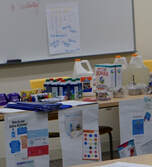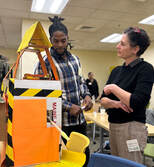Program Design
Positive youth outcomes are too important to leave to chance. While each program is unique, the need for intentional program design is universal. Programs should be developed from the perspective of the needs and well-being of youth and their families and directly connect program activities to the desired positive youth outcomes. OST programs designed and structured to incorporate age-appropriate youth development practices, equity and access, cultural responsiveness, learning styles, and quality will lead to achieving those youth outcomes.
Click here to return to Training Workshops and Series.
Click here to return to Training Workshops and Series.
Introductory Level Training
MAY 2024 Makerspace Workshops
Brought to you by OST Learning Institute and STEAM Initiative
Brought to you by OST Learning Institute and STEAM Initiative

Exploring the Power of Makerspaces
Facilitated by Danielle Wright Tuesday, May 21st 2024 10:00am - 12:00pm Moses Youth Center Register Here Are you ready to boost your STEAM offerings and ignite creativity in your program? Join us for an exciting exploration into the world of making! Whether you're looking to introduce Makerspace concepts or enhance your existing programs, this session is designed to inspire and empower. What to Expect:
|

Cardboard Box Arcade Workshop
Facilitated by Greg Green Thursday, May 23rd 2024 10:00am - 12:00pm Moses Youth Center Register here Join us for a hands-on workshop where we'll unleash our creativity and explore the endless possibilities of cardboard! In this interactive session, participants will learn how to transform simple cardboard boxes into an exciting arcade filled with fun games and activities. What to Expect:
|
MARCH 2024
Summer Planning Retreat
For Program Directors
Brought to you by OST Learning Institute and STEAM Initiative
Friday, March 8th 2024
10:00am - 1:00pm
Facilitated by Melina O'Grady and Melinda Barbosa
Designed for Program Directors and other full-time youth workers, this retreat is a facilitated space for you to STRETCH (in more ways than one), with facilitators Melinda Barbosa & Melina O’Grady as guides. Join fellow Program Directors/Staff Leaders to strengthen your practice in program design and planning & find inspiration from your peers. The day includes a mini-presentation on "Stretch" to ignite creativity and innovation, along with a workshop from the MSYEP team sharing strategies on how to best support MSYEP staff. Join us for a fulfilling half-day of learning, collaboration, and inspiration as we gear up for an enriching summer experience for our youth across Cambridge!
Register Here.
Summer Planning Retreat
For Program Directors
Brought to you by OST Learning Institute and STEAM Initiative
Friday, March 8th 2024
10:00am - 1:00pm
Facilitated by Melina O'Grady and Melinda Barbosa
Designed for Program Directors and other full-time youth workers, this retreat is a facilitated space for you to STRETCH (in more ways than one), with facilitators Melinda Barbosa & Melina O’Grady as guides. Join fellow Program Directors/Staff Leaders to strengthen your practice in program design and planning & find inspiration from your peers. The day includes a mini-presentation on "Stretch" to ignite creativity and innovation, along with a workshop from the MSYEP team sharing strategies on how to best support MSYEP staff. Join us for a fulfilling half-day of learning, collaboration, and inspiration as we gear up for an enriching summer experience for our youth across Cambridge!
Register Here.
Key Elements in Workshop Design
Facilitated by Melina O'Grady
Friday January 19, 2024
10:00am - 12:30pm
Want to add to your activity planning skill set?
Join us for an introductory training on Key Elements in Workshop Design. We will review the Assessment of Program Practices Tool (APT) to explore planning quality activities that promote specific skills, stimulate thinking, encourage collaborative work, center youth voice, and spark curiosity.
10:00am - 12:30pm
Want to add to your activity planning skill set?
Join us for an introductory training on Key Elements in Workshop Design. We will review the Assessment of Program Practices Tool (APT) to explore planning quality activities that promote specific skills, stimulate thinking, encourage collaborative work, center youth voice, and spark curiosity.
STEAM Habits of Mind
Wednesday May 31st 2023
10:00am - 12:00pm
Curious about how STEAM Projects help youth learn?
There’s a lot of talk about STEAM, STEAM, STEAM in after school programming. This workshop will look at how Cambridge youth programs are building STEAM habits of mind in young people. We examined Engagement, Persistence, Exploration and Curiosity. We asked about Identity and Belonging. We have two years of research to share, and we want to share it with YOU!
Participants will:
Wednesday May 31st 2023
10:00am - 12:00pm
Curious about how STEAM Projects help youth learn?
There’s a lot of talk about STEAM, STEAM, STEAM in after school programming. This workshop will look at how Cambridge youth programs are building STEAM habits of mind in young people. We examined Engagement, Persistence, Exploration and Curiosity. We asked about Identity and Belonging. We have two years of research to share, and we want to share it with YOU!
Participants will:
- Be the first to see the full results of the Habits of Mind report, program observations and youth focus groups
- Connect with other OST staff about STEAM programming
- Be thought partners in determining next steps of the research




